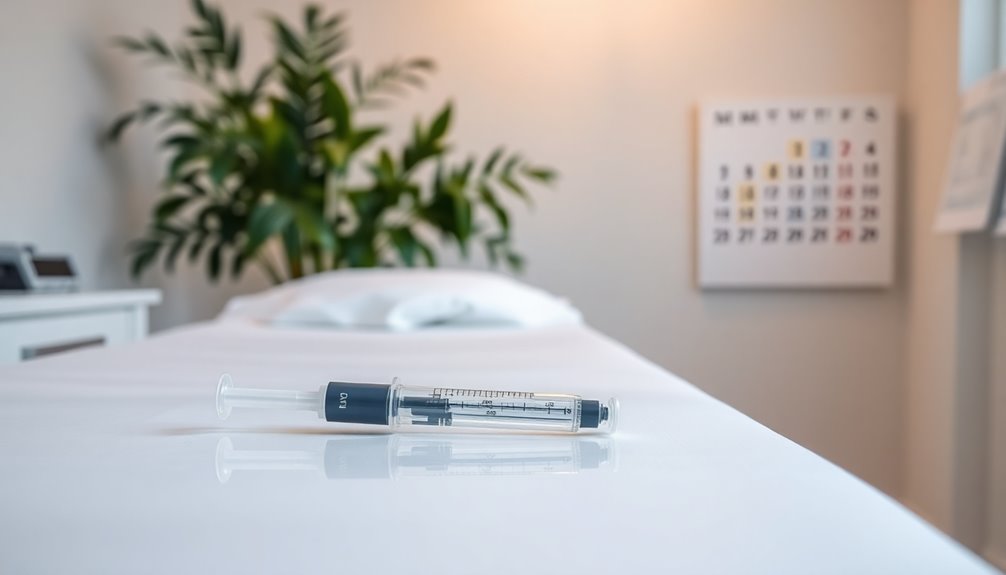You can stop your period for sex by using hormonal methods like combination pills or vaginal rings, especially if you use them continuously. Hormonal IUDs can lighten or even stop periods after an adjustment period. If you prefer non-hormonal options, over-the-counter medications like ibuprofen can reduce menstrual flow considerably. Lifestyle changes, such as maintaining a balanced diet and managing stress, may also help. Remember to consult with a healthcare provider to find the best choice for your needs. There are many options available that can enhance your experience during intimate moments.
Key Takeaways
- Consider using hormonal birth control methods, like combination pills or IUDs, to skip your period temporarily.
- Consult with a healthcare provider about continuous-use pills or skipping placebo pills in traditional birth control.
- Non-hormonal options such as over-the-counter medications can alleviate period symptoms but won't stop the flow entirely.
- Lifestyle changes like maintaining a balanced diet and staying hydrated may help regulate your cycle.
- Discuss medical procedures, like endometrial ablation, with a healthcare provider for more permanent solutions to heavy bleeding.
Understanding Your Menstrual Cycle

Understanding your menstrual cycle is essential for managing your reproductive health and planning activities, including sex. The average menstrual cycle lasts about 28 days, but it can range from 21 to 35 days. Hormonal changes, particularly with estrogen and progesterone, drive this cycle.
Estrogen helps build the uterine lining in preparation for potential pregnancy, while a drop in progesterone triggers menstruation if pregnancy doesn't occur. Tracking your cycle can reveal patterns, making it easier to plan around your period.
Be mindful that factors like age, stress, and health conditions can cause irregular cycles, which might indicate underlying health issues. Knowing your cycle helps you navigate your reproductive health effectively and plan your activities accordingly.
Hormonal Birth Control Options

When you're looking to manage your period around sexual activity, hormonal birth control options can be a game changer. Methods like combination pills and vaginal rings allow you to skip periods by taking active hormones continuously, avoiding placebo weeks.
Continuous-use pills are specifically designed for this purpose, helping you eliminate periods or schedule them as needed. Hormonal IUDs can also lead to lighter periods or even no menstruation after an adjustment period.
The birth control patch functions similarly, letting you skip periods when used continuously, though research is less extensive.
Always consult your healthcare provider to find the most suitable hormonal birth control for effectively managing your menstrual cycles around intimate moments.
Non-Hormonal Methods

If hormonal birth control isn't the right fit for you, there are effective non-hormonal methods to manage your period during intimate moments. Over-the-counter medications like ibuprofen can reduce pain and even decrease menstrual flow by 28-49%. Herbal supplements, such as ginger and raspberry leaf, may help regulate your cycles, although more research is needed.
Consider using menstrual cups for leaks; they won't stop your period, but they offer comfort. A balanced diet and proper hydration support your reproductive health and may help lessen flow intensity.
| Method | Benefits | Notes |
|---|---|---|
| Over-the-counter meds | Reduces pain and bleeding | Ibuprofen is a popular choice |
| Herbal supplements | Potentially regulates cycles | Effectiveness varies |
| Menstrual cups | Comfort and leak management | Doesn't stop the period |
Lifestyle Adjustments for Period Management

Making lifestyle adjustments can greatly impact your menstrual cycle and overall comfort during your period. Regular exercise helps regulate your cycle and might even induce menstruation earlier, aligning it with your desired activities.
A balanced diet rich in vitamins and minerals supports hormonal balance, positively affecting menstrual health and flow. Additionally, practicing stress management techniques like yoga and meditation can alleviate menstrual symptoms and aid in adjusting cycle timing.
Consider incorporating herbal remedies like ginger and raspberry leaf, which some suggest may support menstrual health, though more research is needed.
Finally, staying well-hydrated can reduce bloating and discomfort, making your periods more manageable. By implementing these lifestyle adjustments, you can enhance your overall menstrual experience.
Medical Procedures for Period Control

If you're considering medical procedures to stop your period, there are several options worth exploring.
Endometrial ablation, dilation and curettage (D&C), and hysterectomy each offer different benefits and recovery requirements.
It's crucial to discuss these choices with your healthcare provider to find the best fit for your needs.
Endometrial Ablation Overview
Endometrial ablation is a medical procedure designed to reduce or eliminate heavy menstrual bleeding by destroying the uterine lining. It's ideal for women who haven't found relief through other treatments. Various techniques, like radiofrequency and thermal energy, are used for this procedure, each offering different success rates and recovery times.
| Technique | Success Rates | Post-Procedure Effects |
|---|---|---|
| Radiofrequency | High | Light periods, possible spotting |
| Laser | Moderate | Reduced menstrual bleeding |
| Thermal Energy | High | Minimal bleeding, potential light periods |
While many experience significant improvement, remember that endometrial ablation isn't a form of birth control and can affect your fertility.
D&C Procedure Insights
For women seeking more immediate relief from heavy menstrual bleeding, a D&C (Dilation and Curettage) procedure can be a viable option.
This surgical method involves scraping the uterine lining, which often leads to lighter or even absent periods afterward. Typically performed under anesthesia, you'll need a few days to a week for recovery.
While a D&C can effectively manage periods, it doesn't permanently stop your menstrual cycles.
It's essential to consult with your healthcare provider to discuss the suitability of this procedure for your situation, as there are risks involved, including infection and potential impacts on fertility.
Understanding the benefits and risks will help you make an informed decision about managing your heavy bleeding.
Hysterectomy Considerations
When considering long-term solutions for managing menstrual cycles, a hysterectomy often emerges as a viable option. This surgical procedure involves removing the uterus, effectively stopping your periods permanently.
It's particularly recommended for women facing severe menstrual disorders, fibroids, or endometriosis that haven't responded to other treatments. There are various types of hysterectomies, such as total and subtotal, which can affect hormonal balance and post-surgery symptoms.
Recovery times can vary from a few weeks to several months, and you may experience hormonal changes during this period. Before deciding, it's essential to discuss all risks, benefits, and alternatives with your healthcare provider to guarantee it aligns with your health needs and lifestyle.
Safety and Health Considerations

While it might seem convenient to skip your period for sexual activity, it's vital to prioritize your safety and health. Before using hormonal birth control methods to manipulate your menstrual flow, consult a healthcare professional. They can help guarantee the method is suitable for your individual health needs.
Continuous use of options like hormonal IUDs or pills is generally safe, but be aware of potential side effects, such as nausea or breakthrough bleeding. If considering high doses of NSAIDs like ibuprofen, discuss this with your provider to avoid risks like stomach lining damage.
Monitoring Menstrual Health
Tracking your menstrual cycle can help you spot patterns and predict when your period will arrive, making it easier to plan for sexual activity.
It's also important to note any unusual symptoms, as these changes can signal potential health concerns.
Tracking Cycle Patterns
To effectively manage your menstrual health, keeping an eye on your cycle patterns is essential. Regularly tracking your menstrual cycle helps you identify patterns in length and flow, allowing you to plan sexual activities around your period.
Using apps or calendars to log menstruation dates, symptoms, and any irregularities boosts your awareness of your cycle's dynamics. Understanding that the average menstrual cycle lasts between 21 to 35 days can help you predict when your period is likely to occur.
Monitoring changes in cycle regularity and duration is vital, as they can signal potential health issues. By keeping a detailed record of your menstrual health, you enhance communication with healthcare providers, facilitating personalized advice and effective management strategies.
Identifying Unusual Symptoms
How can you tell if something's off with your menstrual health?
Regular tracking can help you identify unusual symptoms that require attention.
Keep an eye out for:
- Irregular periods or sudden changes in flow
- Heavy bleeding or spotting between periods
- Accompanying symptoms like severe pain or mood swings
Tips for Special Occasions

Want to enjoy your special occasion without the worry of your period? Consider starting a hormonal birth control regimen a few months in advance.
Continuous-use birth control pills or hormonal IUDs can help you skip your periods entirely, giving you the freedom to celebrate without interruptions.
If you're using traditional birth control, skipping the placebo pills can effectively delay menstruation.
For immediate relief during your event, over-the-counter NSAIDs like ibuprofen can help relieve menstrual cramps and reduce flow, making it easier to participate in activities.
Always consult a healthcare professional to explore the best hormonal options tailored to your specific needs, ensuring you can fully enjoy those special occasions without the hassle of your period.
Consulting With Healthcare Professionals

When planning for special occasions, it's important to reflect on the role of healthcare professionals in managing your menstrual cycle. Consulting with a gynecologist can help you find safe and effective methods to skip your periods, especially when planning for sexual activities.
Here are some key points to take into account:
- Discuss personalized recommendations on hormonal birth control options.
- Share any concerns or side effects related to period manipulation methods.
- Schedule regular check-ups to monitor your reproductive health.
Healthcare professionals can clarify the implications of various birth control methods, including potential risks and benefits.
Open dialogue guarantees that your chosen methods for period management are safe and effective, helping you enjoy your special occasions without worry.
Frequently Asked Questions
How Can I Temporarily Stop My Period During Sex?
If you're looking to temporarily manage your period, consider using hormonal birth control methods like continuous-use pills, which can help delay menstruation.
You could also take over-the-counter NSAIDs, like ibuprofen, to alleviate symptoms and reduce flow.
Communicating openly with your partner about preferences can make things more comfortable.
Finally, using menstrual cups or discs can help manage any mess, enabling you to enjoy intimate moments without worry.
How Do You Get Rid of Period Blood During Sex?
Imagine the chaos of a romantic encounter turning into a scene straight out of a horror movie!
To tackle period blood during sex, you've got a few options. Consider using a menstrual cup or disc for a mess-free experience.
Jumping in the shower can also keep things clean, as water washes away any blood instantly. Plus, don't forget to keep dark towels handy for added comfort and peace of mind!
Open communication with your partner is key.
How Do You Make Your Periods Stop Quickly?
You can't make your period stop instantly, but you can manage it.
Consider hormonal birth control methods, like the pill, which let you skip your period by continuing the active pills. If you prefer a longer-term solution, hormonal IUDs can reduce or eliminate periods over time.
Over-the-counter NSAIDs like ibuprofen may help lessen flow and cramps, but they won't stop it completely.
Always check with your healthcare provider for personalized advice.
How Can I Temporarily Pause My Period?
To temporarily pause your period, consider using hormonal birth control methods. You can skip the placebo week of combination pills or use a vaginal ring to delay menstruation.
If you're looking for a more long-term solution, continuous-use birth control pills can eliminate periods altogether. Always consult your healthcare provider for personalized advice.
Tracking your cycle helps you plan ahead, ensuring you manage your period effectively when important events arise.
Conclusion
In conclusion, if you want to stop your period for sex, consider your choices carefully. Hormonal help, non-hormonal hacks, or lifestyle tweaks can work wonders. Remember, prioritizing your health is paramount, so don't hesitate to seek support from healthcare professionals. With the right preparation and planning, you can enjoy intimate moments without interruption. Embrace empowerment, explore options, and guarantee every experience is enjoyable and exciting!










